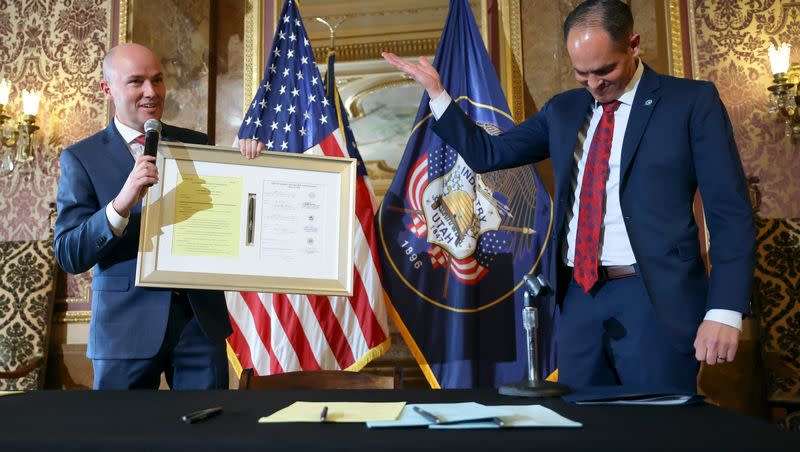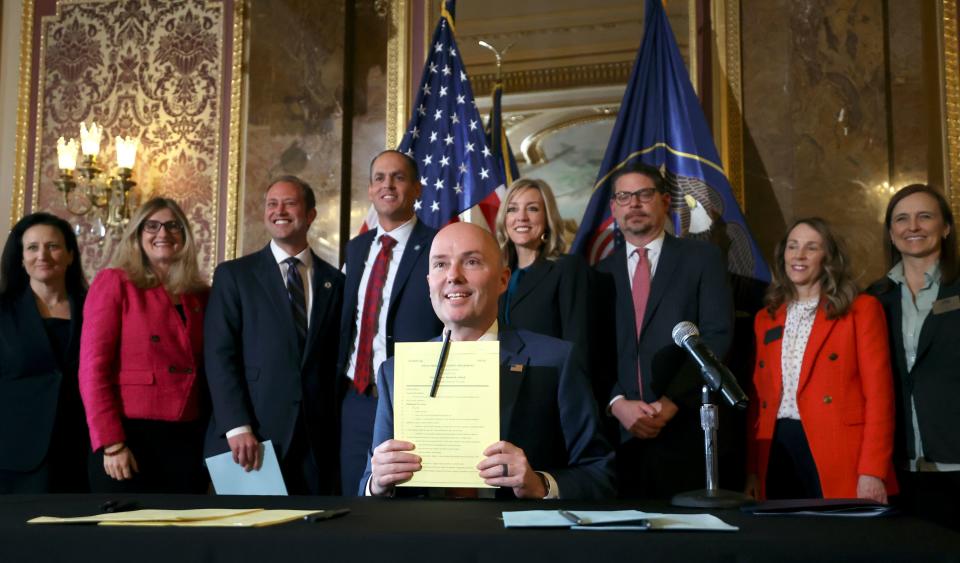Utah becomes the first state with a law that could limit teens’ social media use

- Oops!Something went wrong.Please try again later.
Sitting before a handful of lawmakers, policy experts and stakeholders, Utah Gov. Spencer Cox on Thursday signed into law some of the country’s first and most restrictive social media regulations.
The bills, lawmakers say, are described as “tools” for parents, giving them greater control over their children’s social media use, while mandating that companies like Meta or TikTok implement and change certain policies aimed at minors. One of the most notable changes is that all Utahns will soon have to show some form of identification to use social media.
Summed up by Cox, the legislation “significantly changes the relationship of our children with these very destructive social media apps.”
Related
Sponsored by Sen. Mike McKell, R-Spanish Fork, SB152 would enact the Utah Social Media Regulation Act, requiring a social media company to verify the age of a Utah resident before opening an account. For prospective users under 18 years old, the bill directs the social media company to obtain the consent of a parent or guardian before the account is live.
And HB311, sponsored by Rep. Jordan Teuscher, R-South Jordan, prohibits social media companies from using a “design or feature that causes a minor to have an addiction to the company’s social media platform.”
Both bills passed with broad support in the House and Senate.
1. So proud of Gov. @SpencerJCox for signing pathbreaking legislation in Utah today to curb kids’ use of social media & give parents more power to guide their kids’ tech use. Utah has led the way in efforts to protect our kids from Big Tech. https://t.co/Xey7ruFv8W pic.twitter.com/uRbUknDI8v
— Brad Wilcox (@BradWilcoxIFS) March 23, 2023
“These are first of their kind bills in the United States. And that’s huge that Utah is leading out on this effort,” Cox said. “We have lots of states that are interested and I know we’re all having conversations with other governors, other legislators and other states. I suspect that you will see lots of bills like these moving forward.”
But the bills have been criticized by First Amendment and online privacy experts, who say it’s unlikely Utah will be able to enact such regulations without seeing a court challenge.
“Conditioning these rights on a parent giving prior consent is a huge First Amendment problem. Minors have First Amendment rights, and they are limited in more circumstances than for adults, but still only in very narrow circumstances,” said Ari Cohn, a First Amendment lawyer based in Chicago, noting those circumstances almost entirely revolve around sexually explicit material.
“The government is actually saying you have to provide your identity to speak in the first place on social media,” Cohn said.
Cohn and Cox previously sparred on Twitter, ironically, with Cohn citing those same First Amendment concerns, and Cox responding: “You are wrong and I’m excited to prove it.”

Breaking down SB152 and HB311
Titled Social Media Regulation Amendments, SB152 gives social media companies a list of requirements, should a parent consent to their child creating an account. The law instructs companies to:
Prohibit minors from messaging certain accounts.
Restrict the minor’s account from showing up in search results, unless the two accounts are linked through a friending feature.
Shield the minor from advertising, including targeted ads, or promote targeted content or accounts.
Limit the amount of hours a minor can access their account, which is “subject to parental or guardian direction.”
Give the parent or guardian access to the minor’s content and interactions on their account.
The law also directs the Utah Division of Consumer Protection to receive and investigate violations of the law, and impose fines and civil penalties up to $2,500 for each violation. The division will also publish an annual report “evaluating the liability and enforcement provisions of this chapter,” the bill reads.
The law includes a fiscal note of roughly $280,000 in one-time funds and $220,000 in ongoing funds for the division to investigate and enforce violations.
And HB311, titled Social Media Usage Amendments, seeks to curb what Teuscher and other lawmakers say are “addictive” algorithms that cause kids to go down “that rabbit hole where they feel anxious because they don’t have their phone next to them.”
It permits the Division of Consumer Protection to audit records of a social media company to determine its compliance, and paves the way for a civil penalty of $250,000 for each “practice, design, or feature shown to have caused addiction.”
“Addiction” is defined in the bill as “use of a social media platform that ... indicates the user’s substantial preoccupation or obsession with, or the user’s substantial difficulty to cease or reduce use of, the social media platform; and causes physical, mental, emotional, developmental, or material harms to the user.”
The bill is expected to cost $181,000 in one-time funds and $220,000 in ongoing funds for enforcement.
The regulations spelled out in both bills will take place on March 1, 2024.
‘We should step in’
Both Cox, McKell and Teuscher on Thursday pointed to the dire mental health situation for minors, which prompted the legislation.
“I had been doing some research on my own, worried about my own kids and the impact that social media was having on them, the impact it was having on me and looking at the research that was out there,” said Cox
In general, there is an epidemic of mental health issues plaguing teens — a recent Center for Disease Control and Prevention study found that 30% of teenage girls seriously considered attempting suicide, and 50% had sustained periods of loneliness and depression.
Related
“I compare social media to something like tobacco because it has a catastrophic impact, and the impact that we see is diminished mental health, and it’s a huge problem — cyber bullying is a huge problem, and when we’ve got 30% of our girls considering suicide, we should step in,” McKell told the Deseret News Thursday.
While there is a bevy of research pointing to a strong link between prolonged social media use and depression, anxiety, loneliness, self-harm, and suicidal thoughts, that CDC study in particular does not cite social media use, and Cohn said both bills take a “a startlingly broad position.”
“There are so many things that minors do on social media that are entirely non-problematic,” he said. “And trying to evade the bad things by cutting them off from social media entirely before parent consent is just so wrong that it can’t possibly pass constitutional muster.”
‘States have tried things like this before’
Cohn says he’ll be surprised if much time passes before individual companies or trade associations sue the state over the laws. “States have tried things like this before,” he said.
Cox recently told reporters he’s confident the state will prevail in court, echoed by Teuscher on Thursday.
“We expect that it will likely be challenged, but we feel really confident that we drafted the bills in such a way that they won’t be susceptible to challenges,” he said.
Any companies challenging the laws will have years of precedent on their side. In 1996, the U.S. Supreme Court declared the internet a free speech zone in Reno v. ACLU. And in 2011, the same court said a California law limiting the sales of violent video games to minors violated the First Amendment in Brown v. Entertainment Merchants Association.
Cox has previously said prior cases were wrongly decided, and that the internet has evolved since the rulings, though he did not offer specifics.
“Is the court really likely to upend decades of precedent? I think that’s less likely than the governor would imagine,” Cohn said. “And I don’t think this court will find itself less committed to these basic principles ... I’m not seeing a roadmap that if I were Gov. Cox, I would feel supremely confident about.”
Cohn isn’t alone in his criticism, and Utah’s new laws have raised the eyebrows of numerous First Amendment and family advocates.
“The bill does not consider children’s and teens’ rights, or their need for agency and independence,” wrote the Family Online Safety Institute.
“These bills, while trying to solve a real problem with minors and social media usage, would be an unprecedented intrusion on Utahns’ rights to privacy and freedom of expression,” Americans for Prosperity said in a statement.
“If I’m a kid feeling really abused in my house, I’m feeling rejected because of, say, my gender or sexual identity, and I know that my parent can access (the social media account) at any time by law, I might be less likely to actually engage in the process, and I might feel more alone than ever,” Sarah Coyne, a professor in the School of Family Life at Brigham Young University, said in a recent radio interview.
When reached for comment, a Meta spokesperson said the company will continue to work with experts, lawmakers and parents on the issues brought up by Utah lawmakers.
“We want teens to be safe online. We’ve developed more than 30 tools to support teens and families, including tools that let parents and teens work together to limit the amount of time teens spend on Instagram, and age verification technology that helps teens have age-appropriate experiences. We automatically set teens’ accounts to private when they join Instagram, and we send notifications encouraging them to take regular breaks. We don’t allow content that promotes suicide, self-harm or eating disorders, and of the content we remove or take action on, we identify over 99% of it before it’s reported to us,” the spokesperson said.
Questions about privacy, age verification remain
Because the bills aren’t slated to take effect for another year, it’s likely lawmakers will revisit the issue in the legislature’s next general session. Plus, the age verification process, which McKell’s bill hinges on, still needs to be created by the Division of Consumer Protection and will likely require coordination from social media companies.
“Come to the table, work with us,” Teuscher said in a message to social media companies. “If there are better solutions than what we have in these bills, we’ll implement them. We’ll pass them at the beginning of next session. But right now the clock is ticking. They understand what’s going to happen if they don’t take any action.”
The question of age verification is another sticking point for First Amendment and privacy experts. McKell on Thursday said it can’t be “limited to a government form of ID,” and that lawmakers and the division are looking for other options.
Cohn says that will have sweeping implications for everyone.
“This is not only going to apply to kids. You can’t figure out who is a minor or who is not a minor, unless you age verify everyone. So the implications for anonymous speech are huge, too,” he said. “... There is a data point somewhere that will exist, that connects you to those posts. There is no more anonymity. And this country was built on anonymous speech.”
McKell tried to quell those concerns, telling the Deseret News “in this legislation, our consumer privacy laws trump everything. Your privacy will be protected.”
Another item that several experts questioned is how to define “addictive” in Teuscher’s bill.
“It’s very difficult to surmise what people mean by addictive when they're talking about social media,” said Cohn, noting that the “entire premise” of a media company is to keep its customers engaged. He likened it to your favorite “addicting” TV show.
Teuscher said his bill is strictly targeting algorithms, saying there’s a big difference between that and “just presenting information.”
“(HB311) allows for these social media companies to report quarterly to the Department of Commerce and have an independent audit that shows that those algorithms haven't been built to cause minors to be addicted to these platforms,” he said.

